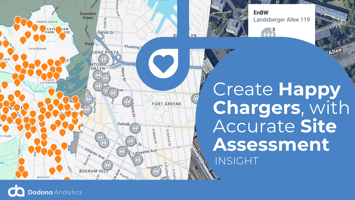Join us for an exclusive webinar tackling the real challenges of maintaining happy, efficient EV...

Happy chargers might seem like a fun idea, but there are real economic benefits to having EV chargers in your community, as Chris Chamberlain has discovered in research from the US.
We’ve been running a content campaign about “Happy Chargers” that has a double meaning for us - it represents both a satisfied EV driver and a highly utilised, strategically placed charging point.
It sounds like a bit of fun, but there is increasing research and media coverage that point to the fact that, together, well-placed EV chargers and happy consumers build a foundation for economic uplift, particularly for Main Street America, where considerable uncertainty has followed the changes in federal support for the industry.
In this blog post, I would like to share five observations based on research and media coverage I have been seeing that suggest why individual states need to step up.
#1 Tourism
Happy chargers keep roadtrippers happy and local economies thriving.
EV drivers plan their travel around the availability of chargers. It has been reported that regions like New Hampshire could lose $1.4 billion in tourism revenue by 2031 due to inadequate electric vehicle (EV) infrastructure.
While neighboring states with better charging access, such as Vermont and Maine, are becoming increasingly attractive destinations for electric vehicle (EV) driving tourists.
#2 Boosting Main Street Businesses
A happy charger doesn’t just fuel a car - they fuel the coffee shop, bookstore, and diner next door.
EV drivers are often higher-income, exploratory spenders who’ll shop, eat, and explore while they charge.
In their research article, the catchily titled “Effects of electric vehicle charging stations on the economic vitality of local businesses”, US-based Nature shares that EV chargers increased local business spending by 3-5% for every business in close proximity to a new charging station. Specifically, the research found that:
“...the introduction of a newly-opened EVCS leads to an average yearly total gain of $ 3412 in customer spending….”
Clearly, a single well-placed charger can lead to increased foot traffic, longer dwell times, and higher spending.
#3 Smart Locations Create Economic Multipliers
A happy charger isn’t just hardware - it’s a customer magnet when you put it in the right place.
Chargers located near retail corridors or tourist hubs offer both utility for drivers and revenue for the community.
We understand the difference between simply installing chargers, based on a hunch or gut feel, and hoping to see these benefits, and strategically deploying them by leveraging data on feasibility and viability, and maximizing these local economic opportunities.
#4 Equity and Access in Underserved Communities
EV adoption doesn’t just benefit wealthy zip codes; a well-placed happy charger supports economic inclusion in rural and low-income areas.
As this article from the Massachusetts Institute of Technology (MIT) highlights, the spending increases were particularly pronounced for businesses within 100 yards of charging stations and for businesses in low-income areas.
Quoting the same Nature article that I referred to earlier, and one of it's authors Shenhao Wang, they shared this:
“It highlights the importance for policymakers to develop EV charging stations in marginalized areas, because they not only foster a cleaner environment, but also serve as a catalyst for enhancing economic vitality.”
#5 The Risk of Rolling Back Support
Lack of federal funds could slow momentum.
There is a ton of research into the economic benefits of EV chargers for local businesses and communities, which I have only touched on briefly here, and as a team, we will be digging into this topic some more and sharing that.
It’s clear that the federal support reductions, such as suspending the $5 billion NEVI program, risk stalling progress and the economic momentum that has been building around clean transportation for tourism, local businesses, hotel chains, coffee, and restaurant franchises.
From Chargers to Catalysts
It might seem a bit of an exaggeration to suggest that with the right policies and placement, every EV charger can become a little local economic engine, transforming how we fuel not just cars, but the community that surrounds them..
Yet, the data I am digging into at the moment suggests this is the truth. EV adoption remains high among the kind of affluent consumers every commercial community or tourist destination wants to attract, so happy chargers definitely have economic power, and in the absence of federal funding, US states and entrepreneurial charge point operators have an opportunity to fill this gap.
Chris is our Co-Founder and Head of Sales. He is an evangelist for eMobility and is passionate about helping the sector make better, evidence-based decisions with data science and AI.
You can follow Chris Chamberlain on LinkedIn


-1.png?height=200&name=LinkedInLivesynergEVWebinar%20(1)-1.png)


